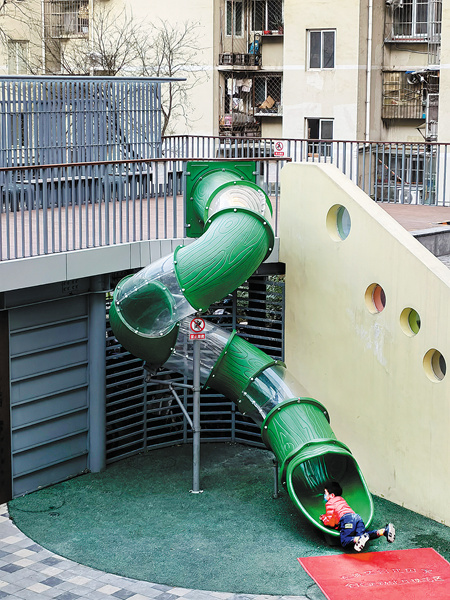Building up a better community


Xue hopes it's an interesting place for people to commune with nature, and one that has enough diversity for people to choose how they would like to have fun there.
"We didn't expand the space, but just used it more efficiently by making the once messy space usable," he says, adding that there are lots of similar obscure corners in old neighborhoods that have the potential to be better utilized.
And most importantly, the transformation-simple, plain but functional-doesn't cost much.
Back in the 1980s, during his college years, Xue was often told to pay respect to nature, cultural history and the people. Therefore, he thinks that what he does as part of the regeneration project is retrospective to the essential value of architecture rather than an evolution.
"The value of architecture counts only if the users like it, not the architect," he says.
And architects today are also seeking a sense of self-value in the process of creating a more humanized community environment that can help people preserve the subtle memory and atmosphere of life, as well as designing large buildings, according to Xue.
As barrier-free facilities increasingly turn up in communities in Beijing, people's understanding of the infrastructure has been transformed.
Just these tiny changes in outdoor spaces have made them realize the facilities are for everyone-the elderly, pregnant or physically challenged, and children.
Beijing launched the nation's first regulation on barrier-free facility construction in 2004, and a new regulation on building a barrier-free environment, amended, based on the 2004 version, has been implemented since November.
Compared to the previous regulation, the new version broadens the scope of use, from special care for people with physical challenges to encompass the welfare of all members of society, meanwhile also promoting new technology support to bridge the digital gap and reinforcing social services in the field.
The regulation pays special attention to the needs of people with disabilities and the elderly, especially as the latter will account for one quarter of the city's population by 2025, as Beijing announced on Nov 26. By 2020, the city had nearly 4.3 million people above 60 years old, according to Beijing Daily.
Sun Yiping, deputy director of Tsinghua University's Institute for Accessibility Development, says that building a barrier-free environment aims to create a more inclusive society. The change of terminology from "facilities" to "environment" will help promote the concept of universal accessibility.
- China-Africa cooperation powers up Africa's battle against poverty
- China-aided schools make education easily accessible for Botswana children
- Blue skies in Tibet boon for locals, boost to tourism
- Veteran actor writes 'letter of apology' to father with directorial debut
- Young art teachers receive recognition for originality




































